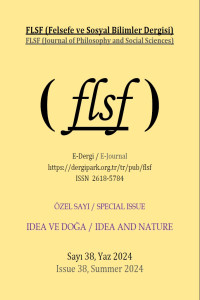Abstract
Bu çalışmanın amacı, Leo Strauss’un politik olanın doğasına ilişkin düşüncelerini incelemektir. Strauss, politik olanın doğasını, filozof ve filozof olmayan arasındaki bir ayrımdan hareketle kavrar. Politik olanın bu şekilde kavranışı, politik olanın aynı zamanda felsefe ve moralite ile ilişkisini de yansıtır. Strauss, politik olanın eşitsizlikçi doğasını, politik felsefenin en temel sorusu olan ‘en iyi rejim’ sorusu için en uygun olanak olarak görür. Modern politik felsefeyi bu eşitsizlikçi zeminden hareketle inceleyen Strauss’a göre Machiavelli ve Hobbes’un düşünceleri politik olanın doğasını doğru anlamaktan uzaktır. Onlar, politik olanın doğasına karşı bireysel insan doğasını ve onun eşitlikçi temelini önceler. Bu eşitlikçilik ise, Strauss’a göre politik olanı güce, iktidar arzusuna ve bitimsiz çatışmaya indirgeme tehlikesi taşımaktadır.
References
- Leo Strauss, “Niccolo Machiavelli”, History of Political Philosophy, L.Strauss ve J.Cropsey (der), Chicago: The University of Chicago Press, 1987, ss.296-318
- Leo Strauss, An Introduction to Political Philosopy:Ten Essays by Leo Strauss, H.Gildin (der), Detroit: Wayne State University Press, 1989
- Leo Strauss, Devlet: Platon’un Politik Felsefesi, çev. Özgüç Orhan, İstanbul: Pinhan, 2019
- Leo Strauss, Natural Right and History, Chicago: University of Chicago Press, 1963
- Leo Strauss, Persecution and the Art of Writing, Chicago: The University of Chicago Press, 1988
- Leo Strauss, Political Philosophy of Hobbes: Its Basis and Its Genesis, çev. Elsa M. Sinclair, Chicago: The University of Chicago Press, 1963
- Leo Strauss, Politika Felsefesi Nedir, çev. Solmaz Zelyut, İstanbul: Paradigma, 2000
- Leo Strauss, Rebirth of Classical Political Rationalism, Chicago: The University of Chicago Press, Chicago, 1989
- Leo Strauss, Studies in Platonic Political Philosophy, Chicago: The University of Chicago Press, 1983
- Leo Strauss, The City and Man, Chicago: Rand McNally&Company, 1964
- Leo Strauss, Toughts on Machiavelli, Chicago: The University of Chicago Press, 1958
- Machiavelli, Prens, çev. Kemal Atakay, İstanbul: Can, 2018
- Machiavelli, Söylevler, çev. Alev Tolga, İstanbul: Say, 2009
- Platon, Devlet, çev. Sabahattin Eyüboğlu ve M. Ali Cimcoz, İstanbul, İş Bankası Kültür Yayınları, 2010,
- Shadia B. Drury, “Taming the Power,” Leo Strauss, Education and Political Thought, J.G. York ve M. A. Peters (der), Madison: Fairleigh Dickinson University Press, 2011
- Steven B. Smith, Reading Leo Strauss: Politics, Philosopy, Judaism, Chicago: University of Chicago Press, 2006
- Ömür Birler, “Felsefeyi Korumak Gerekir: Leo Strauss’un Eşitlikçilik Karşıtı Muhafazakârlığının Temellerine Dair”, Kültür ve İletişim, 27(1), 2024, ss. 82-109
Abstract
The aim of this study is to examine Leo Strauss's thoughts on the nature of the political. Strauss conceives the nature of the political through a distinction between philosopher and non-philosopher. This understanding of the political also reflects its relationship with philosophy and morality. Strauss sees the inegalitarian nature of the political as the most appropriate possibility for the 'best regime' that is the fundamental question of political philosophy. According to Strauss, who examines modern political philosophy from this inegalitarian basis, the thoughts of Machiavelli and Hobbes are far from correctly understanding the nature of the political. They prioritize an individual human nature and its egalitarian basis over the nature of the political. For Strauss, this kind of egalitarianism carries the danger of reducing the political to power, desire for power and endless conflict.
References
- Leo Strauss, “Niccolo Machiavelli”, History of Political Philosophy, L.Strauss ve J.Cropsey (der), Chicago: The University of Chicago Press, 1987, ss.296-318
- Leo Strauss, An Introduction to Political Philosopy:Ten Essays by Leo Strauss, H.Gildin (der), Detroit: Wayne State University Press, 1989
- Leo Strauss, Devlet: Platon’un Politik Felsefesi, çev. Özgüç Orhan, İstanbul: Pinhan, 2019
- Leo Strauss, Natural Right and History, Chicago: University of Chicago Press, 1963
- Leo Strauss, Persecution and the Art of Writing, Chicago: The University of Chicago Press, 1988
- Leo Strauss, Political Philosophy of Hobbes: Its Basis and Its Genesis, çev. Elsa M. Sinclair, Chicago: The University of Chicago Press, 1963
- Leo Strauss, Politika Felsefesi Nedir, çev. Solmaz Zelyut, İstanbul: Paradigma, 2000
- Leo Strauss, Rebirth of Classical Political Rationalism, Chicago: The University of Chicago Press, Chicago, 1989
- Leo Strauss, Studies in Platonic Political Philosophy, Chicago: The University of Chicago Press, 1983
- Leo Strauss, The City and Man, Chicago: Rand McNally&Company, 1964
- Leo Strauss, Toughts on Machiavelli, Chicago: The University of Chicago Press, 1958
- Machiavelli, Prens, çev. Kemal Atakay, İstanbul: Can, 2018
- Machiavelli, Söylevler, çev. Alev Tolga, İstanbul: Say, 2009
- Platon, Devlet, çev. Sabahattin Eyüboğlu ve M. Ali Cimcoz, İstanbul, İş Bankası Kültür Yayınları, 2010,
- Shadia B. Drury, “Taming the Power,” Leo Strauss, Education and Political Thought, J.G. York ve M. A. Peters (der), Madison: Fairleigh Dickinson University Press, 2011
- Steven B. Smith, Reading Leo Strauss: Politics, Philosopy, Judaism, Chicago: University of Chicago Press, 2006
- Ömür Birler, “Felsefeyi Korumak Gerekir: Leo Strauss’un Eşitlikçilik Karşıtı Muhafazakârlığının Temellerine Dair”, Kültür ve İletişim, 27(1), 2024, ss. 82-109
Details
| Primary Language | Turkish |
|---|---|
| Subjects | Philosophy of State, History of Ideas |
| Journal Section | Research Articles |
| Authors | |
| Publication Date | September 20, 2024 |
| Submission Date | June 13, 2024 |
| Acceptance Date | August 21, 2024 |
| Published in Issue | Year 2024 Issue: 38 |
Starting from 2024, our journal will be published in 3 issues as two regular and one special issues. These issues will be published In May (regular issue), September (special issue) and December (regular issue).
Only articles within the scope of the file will be included in our special issue.
Thank you for your attention.

